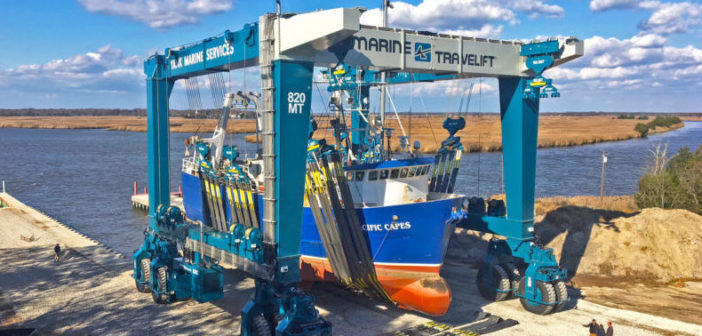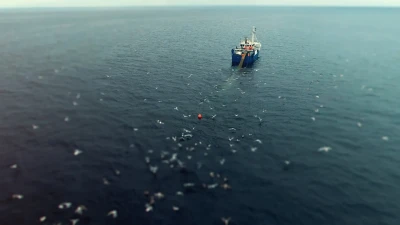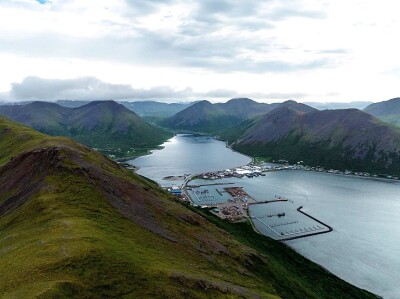An 820-metric-ton Marine Travelift – the second biggest boat hoist in the U.S. and largest on the mid-Atlantic coast – will allow Yank Marine Services LLC to handle some of the region’s biggest workboats on the Maurice River in New Jersey.
“This Travelift was 12 years in the making. It took us far longer than we thought,” said company president Bette Jean Yank, as she and husband and company founder John Yank greeted a crowd of friends at the public debut of the giant boat lift Monday.
“It’s the second biggest in the country, and the biggest between Norfolk, Va., and North Kingston, R.I.,” she said. “It means we can work on every commercial fishing boat in Cape May (N.J.) and Atlantic City (N.J.). We have opened a whole new market here. We can work on the bigger Coast Guard vessels, like the 87’ patrol boats.”
Yank Marine purchased the property a dozen years ago in Dorchester, a Delaware Bay village with a long shipbuilding heritage. The Yanks knew it would be an ideal location, with deep water and none of the bridges that limit access on the Great Egg Harbor River approaches to their facility at Tuckahoe, N.J., a few miles north.
In the years since John Yank started the business in 1969, the company has used Marine Travelift hoists ranging from 50 tons to 300 tons capacity from the company based in Sturgeon Bay, Wis. Trading in a 200-ton machine helped seal the deal for a $3.8 million lease purchase of the new lift, the latest of some $8 million of investment in the Dorchester property. It arrived in 27 truckloads to be assembled and was operational around Nov. 22.

A crowd assembled to check out the new 820 metric ton Marine Travelift at Yank Marine yard at Dorchester, N.J. Kirk Moore photo.
Yank has close associations with the private ferry and excursion industry – the company is presently building three new vessels for New York Waterway – and hosted a reception for guests on the Philadelphia-based Ben Franklin Yacht.
Their customer base also includes larger workboats and fishing vessels. First boats on the Travelift included the 74.5’x25’x11.7’, 2,000-hp tug Petrel, and the 91.3’x36’x14.8’ Pacific Capes, a crab boat late of Juneau, Alaska, recently acquired by a Cape May fishing company. With its ballast tanks filled, the Pacific Capes was a first test for the machine’s lifting capacity.
For those customers, especially fishermen, the new lift service can spare them the time and expense of steaming to New England yards to get work done, Bette Jean Yank said. Waterfront gentrification has been squeezing the New Jersey commercial industry for years, eliminating older boatyards, but the Delaware Bay shore is one place still so rural that those pressures are far less.
One thing the region now lacks are enough workers with shipyard skills – and Yank Marine will need them.
“You probably have to double the number of people because the boats are bigger and more complex,” said Bette Jean Yank. They anticipate the new business generated by the lift will create 30 to 50 permanent jobs including welders, electricians, shipfitters, sheet metal workers and painters.
The company is working with South Central Louisiana Technical College to develop apprenticeships and attract candidates from the Gulf coast because “we can’t find that kind of labor in this area,” she said.
“It’s a federal program called TransPORTS” that helps companies and entry-level vocational trainees connect with registered apprenticeship programs through the U.S. Department of Labor, said David Matsuda, a former chief of the U.S. Maritime Administration and now a transportation and defense consultant.

Travelift wheels dwarf shipyard founder John Yank and visitors. Kirk Moore photo.
Yank Marine has also been talking with Atlantic Cape Community College near Atlantic City about possibly setting up a similar program. Bringing in more maritime jobs has long been an aspiration of bayshore communities, once some of the richer towns in southern New Jersey thanks to shipbuilding and oysters in the 19th and early 20th centuries.
Slowly the oyster business is coming back – fueled by a growing restaurant trade in nearby cities and Jersey Shore resorts – and state and local political leaders have made some money available to help.
Yank Marine was able to use a $2.2 million loan to build new piers for its Travelift, from a state program after Hurricane Sandy struck in 2012 to build economic and job opportunities. One of the Travelift’s next customers is the A.J. Meerwald, a restored 85’x22.3’x6’, 59-ton oak two-masted gaff oyster schooner built in 1929 by the Charles H. Stowman & Sons shipyard in Dorchester. Now operated by the non-profit Bayshore Center at Bivalve as New Jersey’s official tall ship, it is coming into the Yank facility for an engine repower.
This article was originally published on Workboat.com and is republished here with permission.







